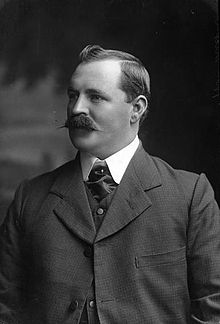- Charles McGrath
-
Charles McGrath 
Member of the Australian Parliament
for BallaaratIn office
31 May 1913 – 13 December 1919Preceded by Alfred Deakin Succeeded by Edwin Kerby In office
10 July 1920 – 31 July 1934Preceded by Edwin Kerby Succeeded by Archibald Fisken Personal details Born 10 November 1872
Newtown, VictoriaDied 31 July 1934 (aged 61) Nationality Australian Political party Labor (1913–31)
UAP (1931–34)Spouse(s) Elizabeth Johnstone Gullan Occupation Storekeeper David Charles McGrath (10 November 1872 – 31 July 1934) was an Australian politician. Originally a member of the Australian Labor Party, he joined Joseph Lyons in the split that led to the formation of the United Australia Party.
Contents
Early life
McGrath was born at Newtown, Victoria to David McGrath, an Irish-born miner, and Evelyn, née Horsefield, an Englishwoman. He attended Newtown State and Creswick Grammar schools before working at the family store at Allendale. He was a member of the South Ballarat football team during the 1890s. He married Elizabeth Johnstone Gullan in Ballarat on 24 May 1898; the couple moved to Pitfield Plains in 1900 to expand the family business.
State politics
In 1904, McGrath was elected to the Victorian Legislative Assembly for Labor, representing the seat of Grenville. He became known as a spokesman for the mining industry, and earned the nickname "Bull" for his promotion of Labor in country areas; with Frank Anstey, he travelled extensively in the Gippsland area in November 1904.
Federal politics
In May 1913, McGrath transferred to the federal House of Representatives, representing the seat of Ballaarat. A vocal advocate for improved conditions for soldiers, McGrath enlisted in the armed forces in March 1916, travelling overseas as part of the Australian Imperial Force. Until his 1918 dischargement as medically unfit, he was promoted to warrant officer.
McGrath was defeated at the 1919 election by a single vote; however, the result was declared void and a by-election was held in July 1920, in which McGrath was elected. He continued to support soldiers' issues, notably repatriation benefits, and criticised the method of bestowing Imperial honours.
McGrath held a number of positions (including Deputy Speaker) in the Scullin Government, but in the wake of the Great Depression became drawn to Sir Otto Niemeyer's solution to the nation's financial situation. As a result, in 1931 he was one of the Labor members who joined Joseph Lyons in leaving the Labor Party and merging with the Nationalists to form the United Australia Party. He continued as a UAP member until his death from ill health in 1934. He was buried in Ballarat, and was survived by his wife, two daughters and two sons.
References
- Love, Peter (1986). "McGrath, David Charles (1872 - 1934)". Australian Dictionary of Biography. Canberra: Australian National University. http://www.adb.online.anu.edu.au/biogs/A100268b.htm.htm. Retrieved 2008-03-15.
Parliament of Australia Preceded by
Alfred DeakinMember for Ballarat
1913-1919Succeeded by
Edwin KerbyPreceded by
Edwin KerbyMember for Ballarat
1920-1934Succeeded by
Archibald FiskenCategories:- 1872 births
- 1934 deaths
- Australian Labor Party politicians
- United Australia Party politicians
- Members of the Australian House of Representatives for Ballarat
- Members of the Australian House of Representatives
Wikimedia Foundation. 2010.
